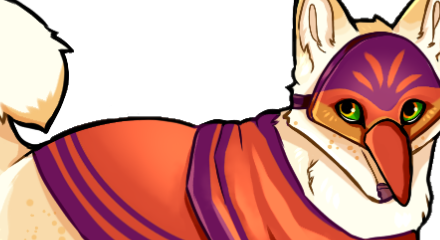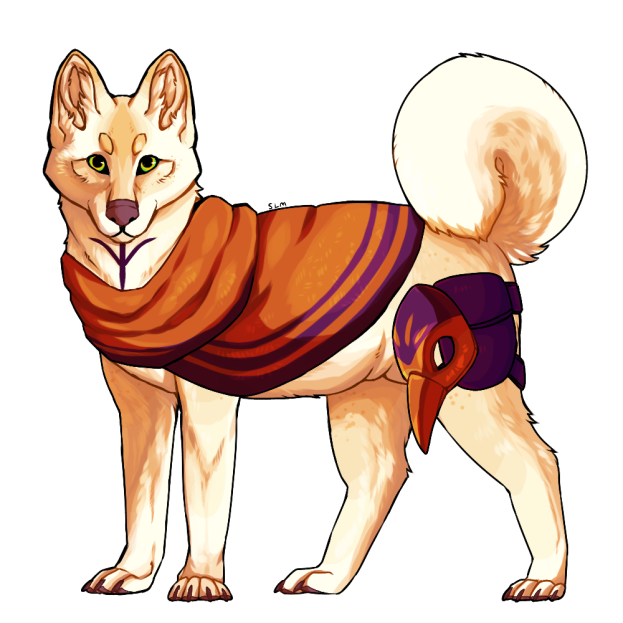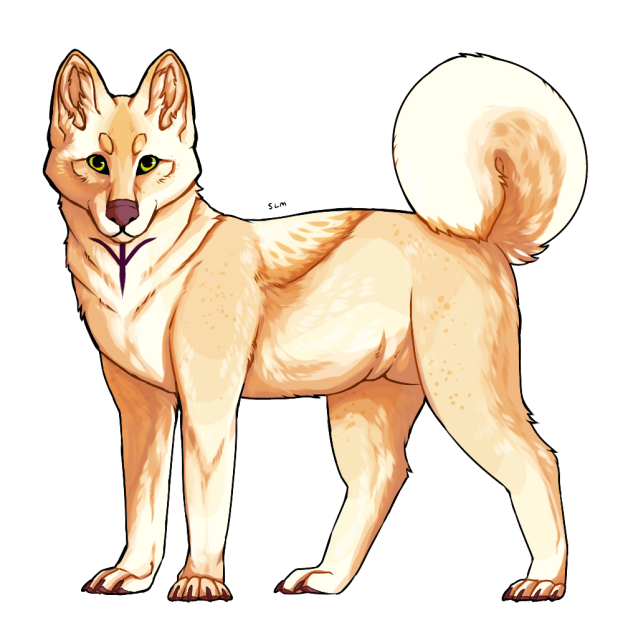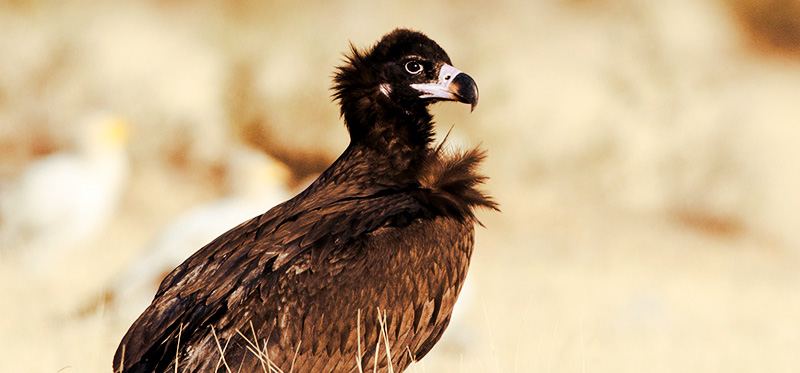Fausta was born inside the walls of Astavium to a rich family - gens Fausta. As her parents’ only daughter, she was almost immediately beloved. She was a compassionate and curious child, always wanting to discover more about the world around her – especially the Astavian culture she was born into. Her father Gaius was the one to introduce her to her first passion: history.
Fausta went on frequent trips to the famous library near their estate and devoured any books she could find describing Astavium’s history, especially the culture heroes whose stories represented its values and ideals. She most looked up to the story of a woman named Perina, who saved a library’s worth of books from being burned down by a band of invaders. When Gaius and Fausta’s mother Aurelia realized how deeply their daughter believed in preserving and understanding the past, they knew they had to do something to nurture that desire - so they spoke to an old family friend named Dimidiata who they hoped would be willing to take Fausta as an apprentice.
Dimidiata Casminaria-Sertor was both a historian and a poet. While most famous for her scathing criticisms of the government, all written in poignant verse, much of her day was spent analyzing a plethora of historical texts in order to inspire and educate herself on her next poem’s topic. One of xyr most beloved areas of interest was religious history. Dimidiata taking Fausta as her apprentice set Fausta’s love for historical pursuits fully ablaze, and the two rapidly became close.
Fausta wasn’t coming of age in the kindest of times, however. The senatorial government of Astavium had been infamously corrupt for years and the gulf between the rich and poor classes of the city grew more blatant by the month. On her daily walks to Dimidiata’s study, Fausta passed more and more beggars lining the paved stone streets pleading with anyone and everyone to give them a job, or even some spare money. Her mentor’s poems grew more and more scathing and their audience grew angrier. It was only a matter of time before the tension erupted.
Despite the rising political turmoil in the background of her life, Fausta rarely had time to focus on it. Her studies with Dimidiata occupied much of her time, and she spent much of her free time reading even more. Her schedule only became more occupied when at a year old, Fausta first met her familiar, Saga – a cinereous vulture.
Vultures are an especially sacred bird to Astavian culture. After the government began to outlaw or smear all other methods of divination but augury, which vultures are most intertwined with, they also became the bird most vividly associated with government approved religious practice. Due to their association with death and the afterlife, vultures are considered messengers to all the gods, but most especially Tor, who the leadership of Astavium had aligned themselves with for centuries. Receiving a vulture as a familiar meant that one was blessed by the gods to have a close relationship with their greatest messenger. In other words - Fausta had been blessed with the power of divination. She was to become an augur.
In Astavium, augurs are high ranking religious officials who ostensibly divine the future by observing the behavior and species of birds. Their predictions are rarely wrong. To become an augur means not only the great status and salary one would expect, but also access to their exclusive and esoteric religious texts documenting their trade. There were only several augurs at any given time, meaning that the government – or really anyone with enough influence who wanted to anticipate what the future held for them – was in close contact with them at all times. In short, it was the opportunity many Astavians dream of.
Fausta and her family were no different. The celebrations were extravagant and overjoyed. Their sweet, beautiful daughter was being elevated to one of the highest positions in society she could hope for, and awakening a power all of them knew to respect. Dimidiata was the only one who seemed on edge. When Fausta asked xem what was wrong, she expressed her excitement, but also worry. After all, Dimidiata was nothing if not wary of those in power – and the insights gained from augury comprised a not insignificant portion of the government’s justifications for being in power. Xe was worried her apprentice would be manipulated into doing something awful and not know until it was too late.
Unfortunately, like many of Dimidiata’s predictions, this would come true.
Fausta transferred from her history apprenticeship to the augurs’ private temple, where her new superiors wasted no time in passing on their knowledge to her. Her free time dwindled to a sliver, she barely had time to spend with her friends and family, but she loved it. Every new book she read was something she’d never seen or even heard of before, containing a treasure trove of knowledge she was lucky enough to be one of the very few allowed to access. She learned the ins and outs of rituals the population spent their time only speculating about, the process to identify every species of bird she could dream of, and met a litany of government officials she’d previously only seen speaking from podiums.
Three months into her training, the pressure underlying Astavian politics erupted all at once. A coup led by a formerly minor general named Iubara turned the existing system on its head in a matter of months. First Iubara turned her contingent of wall guards against Astavium in a siege, then leading senators mysteriously began dying, and by the end of the spring she had taken sole power and declared herself empress. It was by the mercy of the gods that the exchange of power was largely nonviolent – with no standing army beyond law enforcement in the city itself, the inhabitants had no way to defend themselves and so the senate surrendered quickly. The augurs made it through unharmed after a brief but tense negotiation Fausta was uninvolved with. Her family and friends were all scared, but safe.
Around this time, Dimidiata stopped writing poems. Fausta went to her study to find it ransacked and abandoned. She assumed the now-infamous poet had fled the city somehow in order to escape violent punishment at the end of Iubara’s anger and moved onwards with her life.
It took six months for Fausta to finish her training and be promoted to a fully fledged augur. While it often took longer – a year, at the least – the uprising meant that her training had to be accelerated in order to ensure she had full knowledge of augury even in the worst case scenario. She passed her exams with flying colors and was quickly granted her lacerna trabea, divining mask, and throat tattoo.
Meanwhile, Iubara’s hold on the city grew tighter. The people were beginning to protest – many of the most underprivileged social classes had supported her rise to power and were now growing frustrated that she hadn’t done anything to help their situation. The previous government had had its problems, they said, but as evidenced by the augurs, the gods supported them. Iubara was acting in defiance of the gods’ will and must be overthrown.
One of Fausta’s fellow augurs, Lucius, had been poor before his ascension to augury. He was still sympathetic to the plight of the classes he had been born into. To illustrate their point and beg for change, Lucius – along with a small group of protestors – entered the Templum Auspicii and began to pray. They made a sacrifice and – following the now-outlawed divination method of haruspicy, to add additional defiance to their actions – studied the deer’s liver for clues on the gods’ will for Iubara. In little time, the group confidently declared that Iubara was destined to forsake the will of the gods and later be destroyed for her hubris. This verdict spread like wildfire.
Iubara swiftly became incensed at this threat to her power. Her rebuttal was to declare that the Templum had become a false representation of the gods and was corrupted; all divinatory judgements made within its walls were false. To save Astavium, it must be burned away like a rot. In order to give her claims more credibility, she elected to determine via augury done outside of the Templum whether her claims were true and it should be burned down.
The augur she elected for this task was Fausta.
Scared, confused, and feeling like a pawn in a scheme she didn’t understand, Fausta was led to the top of Astavium’s walls. The outer communities – many of which she had never seen before – were sprawled out in front of her in a vivid tapestry. In a shaky voice, she began the ritual by declaring her intentions and pleading with the gods for a message. Her judgement would determine whether the temple both her society and former mentor had loved would burn or survive.
Then she waited.
For several minutes there was nothing – the skies were still, and no bird flew. And then she spotted something in the distance.
A crow, closely followed by a vulture, was flying towards them. As the group watched in shock, the vulture dove, dug its talons into the crow, and killed it after a brief fight. Fausta froze. There was no clearer way to interpret this omen. The temple would burn.
Iubara was ecstatic. First she arrested Lucius and several of the protestors that had been at the ritual with him, then she tied them up inside the temple. The prisoners – and Fausta – could only watch in horror as Iubara’s contingent of guards piled the ancient chamber high with kindling. Then they set it all ablaze.
The prisoners were resolute – they didn’t scream or beg for mercy. Fausta watched, frozen, as the flames rose higher, and then the smell of burnt flesh filled the air.
The temple burned for hours. Whenever the fire was close to burning out, the guards and Iubara added more fuel, until it was reduced to rubble and ashes that had once been people. Fausta and the augurs had been forced to watch the display; perhaps Iubara believed that it would discourage them from rebelling in the same way as Lucius.
Fausta went home and cried. With one verdict, she had set something horrible in motion that she would never be able to stop. She had forsaken the gods and allowed Iubara to burn their place of greatest honor. She couldn’t help but remember her favorite childhood story of Perina, and realized with a sick clarity that she had fancied herself Perina and instead been the invaders all of this time.
A week later she gathered up as much supplies as she could, left her parents a note explaining everything, and ran away from home. She hoped to return someday – but first she needed to atone. One of the greatest punishments Astavians could face, worse than the death penalty, was exile. There was no guarantee that the voices of the gods could reach you outside Astavium. You would spend the rest of your life wandering, cut off from a religion you would no longer be able to practice.
It was the only way Fausta could think of to pay for her sins.
In the outskirts of the city her satchel was almost stolen, and she quickly realized she needed a bodyguard. With little survival skills to speak of, it was evident she wouldn’t last alone either in the city or in the wilderness. When she asked all the guards for hire she could find whether they would accompany her on an indefinite journey through the wilderness, most of them looked at her like she was insane. Their reactions only worsened when she confessed she could think of no adequate payment – despite her wealth, there was no guarantee they’d ever return to Astavium, and outside of the city walls Astavian money was all but worthless.
After several hours of searching, though, she finally found someone who agreed: Zephyri.
It was perhaps one of the luckiest things that had ever happened to Fausta. She was separating herself from the only family and home she’d ever known without knowing when or if she would ever return. She still hadn’t made her peace with the fact that she might never see her parents’ faces again or hear them call her their little girl. But forwards and away, she thought, was the only way she could go.
The two journeyed for several months before making it to Mangata. Along the way Fausta encountered more cultures than she could ever have dreamed of existing, and honed her skills with the common language until she was halfway fluent. Were she an explorer, it would have been the most exciting time of her life – but Fausta was just an exile, and even amid all the discovery she never stopped dreaming of home.





